|
|
|
Sort Order |
|
|
|
Items / Page
|
|
|
|
|
|
|
| Srl | Item |
| 1 |
ID:
153068
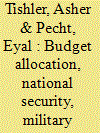

|
|
|
|
|
| Summary/Abstract |
This study develops a dynamic model that integrates military intelligence into the defense capability of the country and the optimal allocation of its government budget. We assert that the effectiveness of the country’s military intelligence is contingent on the quality of its human capital, which, in turn, implies a long-term positive relationship between the government’s various civilian expenditures and its capacity to achieve a cost-effective intelligence and, hence, military capability. This relationship is developed within a multiple-period arms race model between two rivals. Using this model and stylized data for the Israeli–Syrian arms race, we show that an appropriate budget shift from defense to civilian expenditures during the initial periods of the planning horizon will gradually (over a decade, say) increase the quality of human capital in the country and, thus, the effectiveness of its intelligence, which, in turn, will increase the country’s future security and welfare.
|
|
|
|
|
|
|
|
|
|
|
|
|
|
|
|
| 2 |
ID:
171006
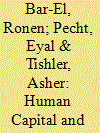

|
|
|
|
|
| Summary/Abstract |
This study evaluates the relationship between a country’s human capital and its capacity to achieve, over time, effective national security. We show that an increase in the importance that a country attributes to its future, and/or in the effectiveness of its education system, leads to a decline in its current civilian services but to increases in its future human capital, civilian services, national security, and social welfare. Data for the Israeli-Iranian arms race confirm our predictions and show that a predilection for short-term political or personal gains impedes investment in human capital and inhibits future economic growth, national security and social welfare.
|
|
|
|
|
|
|
|
|
|
|
|
|
|
|
|
| 3 |
ID:
177824
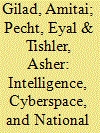

|
|
|
|
|
| Summary/Abstract |
This study evaluates military intelligence as the process of data collection and knowledge development and assessment for decision-making by the military and other governmental agencies. We argue that dominance in modern warfare is enabled by human and technological intelligence that uncovers the rivals’ capabilities and intentions, increases the effectiveness of the country’s own weapon systems, and facilitates the development of high-quality defense systems. Hence, gathering and evaluating intelligence is essential for countries involved in conflict or exposed to terror threats. We focus here on the strategic and tactical implications of intelligence in the context of an arms and intelligence race between two rivals. We present and assess models that show how security agencies in countries in a state of conflict (with other countries and/or non-country entities) should invest in developing their own intelligence capabilities to ensure adequate military (security) capabilities, national security, and welfare. Since advanced cyber attackers can infiltrate almost all complex computer networks to gather intelligence (and/or cause other harms), we show how countries can establish procedures and determine the budgets to optimally allocate cyber-defense resources to prevent harmful cyber-attacks on the complex computer networks that manage their infrastructure, business, security, and government operations.
|
|
|
|
|
|
|
|
|
|
|
|
|
|
|
|
| 4 |
ID:
123166
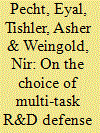

|
|
|
|
|
| Publication |
2013.
|
| Summary/Abstract |
Investments in R&D constitute a major share of the expenditures of the hi-tech industry since, generally, they enable firms to successfully compete in the rapidly and constantly changing markets for hi-tech products and services. The role of R&D projects is particularly important in the areas of defense and homeland security due to the nature of warfare and the continuous threats posed by arms races and by terror organizations. This study analyzes the choice of the R&D projects designed to counter multiple related military threats. It develops the methodology required to assess whether it is preferable to develop one project to thwart several related threats, or several distinct projects, each of which provides an answer to one specific threat or a partial set of the threats. An analytic solution is provided and assessed for two simple models with two related threats. A solution of the model is then provided for any number of related threats, using a dynamic programming methodology. Finally, we demonstrate the usefulness of our model and methodology to Israel's missile defense problem; that is, we show how to optimally develop systems aimed at thwarting the multiple threats of short-, medium-, and long-range missiles.
|
|
|
|
|
|
|
|
|
|
|
|
|
|
|
|
| 5 |
ID:
136959
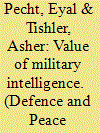

|
|
|
|
|
| Summary/Abstract |
This study evaluates the role of military intelligence in an arms race between two countries. The intelligence apparatus of each country evaluates the rival’s capabilities and intentions, and enhances its military capability by increasing the effectiveness of its own weapon systems and reducing the effectiveness of the rival’s weapon systems. Intelligence superiority also yields an advantage in deterrence and preemption. This study shows the following. (a) Investment in intelligence is much less beneficial for small government budgets, low intelligence efficiency, and a low degree of conservatism on the part of the policy-maker. (b) The expenditure on intelligence increases when intelligence efficiency is low and rising, and decreases when intelligence efficiency is high and rising. (c) Being very conservative may be costly to the country. (d) High-quality human capital substantially improves the country’s security and welfare, particularly when the rivals are engaged in a knowledge race in addition to the usual arms race. An application of the model to the Israeli–Syrian arms race demonstrates its validity and usefulness.
|
|
|
|
|
|
|
|
|
|
|
|
|
|
|
|
|
|
|
|
|